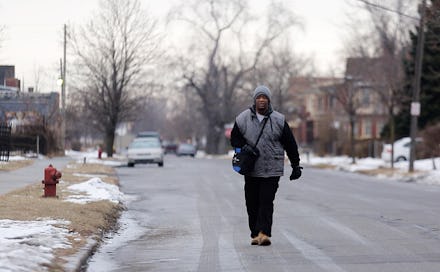This Detroit Man Walks 21 Miles to Work Each Day — But He Shouldn't Have To

James Robertson has taken the country by storm.
The 56-year-old Detroit resident and subject of a recent profile in the Detroit Free Press walks 21 miles each day to get to and from his job at Schain Mold & Engineering in Rochester Hills.
"I sleep a lot on the weekend, yes I do," he told the Free Press. "I can't imagine not working."
His story quickly went viral. It prompted an outpouring of support in states and counties far removed from Detroit, from people who had never met Robertson; it was picked up by myriad news outlets and spawned a wildly successful GoFundMe page that raised more than $190,000 in just two days. Politicians and media outlets have dubbed his work everything from "inspirational" to "heroic."
Robertson's daily trial is part of a larger problem: It's easy to see why Robertson's marathon commute is enormously inspirational. It's a classic, if extreme, example of the strength of individual will. He has persevered through ungodly conditions for more than a decade; the length of his commute meant nights of just two hours of sleep and days punctuated by 2-liter bottles of Mountain Dew and cans of Coke to keep him awake.
"One word — faith," he told the Free Press when asked what keeps him going. The next day, he added another attribute: "Determination."
But his struggle to get to work is emblematic of much larger problems. The most profound thing to come out of Robertson's story isn't the commute itself, but rather the circumstances that warranted it in the first place.
Robertson walks 21 miles a day because the public transportation in Detroit is a wreck. As the Free Press noted in its profile, Robertson "must traverse the no-bus land of rolling Rochester Hills, one of scores of tri-county communities (nearly 40 in Oakland County alone) where voters opted not to pay the SMART transit millage. So it has no fixed-route bus service."
"Robertson's troubles reflect profound policy failures: a pitiful arc of non-action, stretching more than 40 years, that has made this one of the nation's least commuter-friendly metro areas," wrote Free Press's Stephen Henderson in an editorial shortly following the profile's publication. "This region has been unable — and unwilling — to weave together a sensible public transit network. While Robertson's circumstances are extreme, he's but one victim of our collective neglect."
Henderson's right: The outpouring of support for Robertson, while a remarkable example of individual charity, papers over the inability of communities to actually tackle the systematic problems that force hardworking men and women like Robertson to trek across the country in the first place.
"Just think about it for a moment: Strangers are falling over themselves to help subsidize a personal vehicle for one individual (although insurance, gas and maintenance are obviously on him going forward), but voters in dozens of suburban communities in the Detroit area have voted to 'opt out' of the region's public transportation system," writes CityLab's Sarah Goodyear. "In so doing, they have shut down job opportunities for thousands of area residents who are eager for employment, and denied employers access to untapped sources of labor."
It's not just Robertson. As David Graham points out at the Atlantic, Robertson's struggles underlie an ugly reality of the American economy: Though there may be ample jobs available for unemployed workers, the two may not necessarily exist in the same areas.
Indeed, the vasty majority of Americans have a significant commute to work. In 2009, the average commute time was 25 minutes, and more than 76% of workers drove alone to work. For Robertson, and for others across the country, driving simply isn't an option — despite earning almost two dollars more per hour than minimum wage in Michigan, he still can't afford to save up for a car.
But as CityLab's Goodyear notes, the political and economic discontinuity that gives rise to commutes like Robertson's is not simply confined to Detroit.
"Take the example of Lorain County, Ohio, near Cleveland, where 13% of residents don't own cars and one poll found that 42% of county residents would commute by public transportation if they could," writes Goodyear. "There, voters have repeatedly rejected minuscule property tax levies to help fund basic bus service, most recently voting down (by a 58-42 margin) an annual transit tax of $2.28 per $100,000 of property value. As a result, many Lorain County residents find it difficult to get to work and to maintain employment when they do find a way."
In the end, the story serves us more than it serves or describes him. Simply calling Robertson a hero does him and others a disservice. Focusing only on the inspirational part of his story while ignoring the utter policy and institutional failures that put him there to begin with misses the forest for the trees.
Fixating on the grit and determination of his story allows us to neatly avoid confronting the larger issues at hand. As it stands, the country's mentality centers around the fact that Americans would rather give to a single man's donation page instead of donating a higher portion of their taxes to help the less fortunate among us. As Henderson argued, "helping Robertson on an individual basis, as hundreds of generous, compassionate people move by Robertson's story have stepped forward to do, badly misses the larger point."
In our rush to paint Robertson's story as the American Dream incarnate, we miss the deep irony of his situation — that Detroit and the rest of the country's basic failures are precisely the circumstances that put him in such a precarious position. Until that changes, things won't improve. For every James Robertson who receives $100,000 in good samaritan donations, there are 100 other faceless Americans who aren't lucky enough to land in the spotlight.